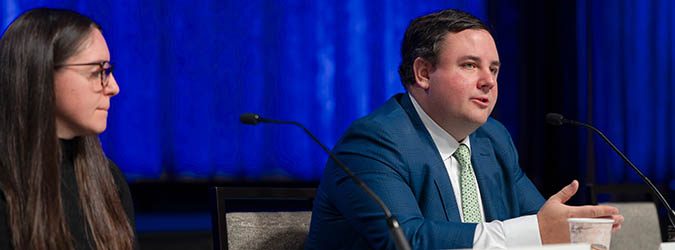Your Family Tree May Be Broader Than You Think
1.16.2025

A pair of experts explored the challenges attorneys face because of the growing use of artificial reproductive technology at a panel Wednesday during the New York State Bar Association’s Annual Meeting.
Robert M. Harper, partner at Farrell Fritz, and Kathleen “Casey” Copps DiPaola, partner at Copps DiPaola Silverman, and co-founder of the New York Surrogacy Center, spoke to nearly 200 people in the day’s opening session of the Trusts and Estates Law Section meeting at the New York Hilton Midtown.
They explored how genetic testing services offered by various companies may lead to the discovery of previously unknown relatives, which raises the question of whether these newfound relatives may be entitled to an inheritance.
A kinship hearing may therefore be required to determine who may be eligible to be a beneficiary if questions of kinship arise throughout the estate administration process. Claimants have the burden of proving kinship in such a hearing by a preponderance of the evidence.
To meet that burden, claimants must show the following at a kinship hearing:
- Their relationship to the decedent.
- The absence of any person with a closer degree of consanguinity (relation) to the decedent, and
- The number of persons having the same degree of consanguinity to the decedent or to the common ancestor.
Some of these proceedings can arise from unusual circumstances. Harper noted one case (Matter of Dann) where a paternity proceeding arose after a decedent’s comment at a bar “that his kid’s mother was across the bar” led to posthumous genetic testing that proved the decedent was the child’s father.
Copps DiPaola discussed another situation where a judge ruled that the parents of West Point Cadet Peter Zhu could use his sperm for surrogate birth. Zhu, who died following a skiing accident, was the last male in the family line, and it was culturally important for his parents to retrieve his sperm so they could conceive a grandchild.
One of the judge’s considerations was Zhu’s status as an organ donor, which included his sperm, and that his parents were first in line for an organ donation.
In addition, the judge considered Zhu’s “presumed intent” from his prior actions and statements including his evident devotion to his family and a list of goals he had previously written that included his intent to “have three kids.”
Despite the unusual circumstances, cases such as Zhu’s are becoming more common according to Copps DiPaola.
She explained one key distinction regarding the intended parent, which is the individual or couple who plans to become legal parent of a child born through surrogacy.
“If the transfer is before death, the deceased intended parent is the parent. If the transfer occurs after death, the deceased intended parent is only a parent if they consented to being a parent pursuant to provisions of EPTL (New York Estate, Powers and Trusts Law),” she said.
Copps DiPaola added that individuals can minimize the possibility of disputes and help dispose of their assets using trusts. When drafting wills, she said lawyers should ask their clients to use inclusive language and be aware of the legal status of a client’s children because sometimes the parents are not listed on a child’s birth certificate.



